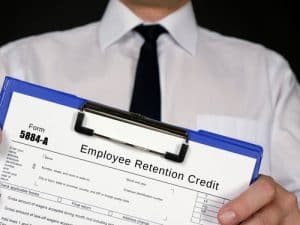Ghost preparers are a rising concern, especially with the employee retention tax credit (ERC). Get informed and safeguard your tax refund.
Our content reflects the editorial opinions of our experts. While our site makes money through
referral partnerships, we only partner with companies that meet our standards for quality, as outlined in our independent
rating and scoring system.

The IRS has repeatedly warned taxpayers of the danger of ghost preparers, but what are ghost preparers, and how do you identify them? And who is being haunted by this new tax scam?
We’re here to demystify these ghosts and help you protect your tax return in the process.
What Is A Ghost Preparer?
A ghost preparer is a tax preparer who “ghosts” taxpayers by not signing tax returns.
Ghost preparers either claim to “forget” to sign, promise to sign later, refuse to sign electronically, or prepare a tax return and have the tax preparer print and send the tax return in instead of signing.
So why is it such a big deal to not sign a tax return?
The issue with ghost preparers is that they often fudge the taxpayer’s numbers by claiming fake deductions or inventing fake income so the ghost preparer gets a larger cut of the refund. Then, once the taxpayer figures out what happened, the tax preparer disappears without a trace, leaving people spooked, broke, and in trouble with the IRS.
Ghost preparers have also been known to put their own direct deposit information or mailing address in the tax return so that they receive the tax refund instead of the taxpayer.
Are Ghost Preparers More Likely With The Employee Retention Credit?
The IRS recently paused processing ERC claims because of the uptick in dishonest businesses taking advantage of taxpayers reporting thousands of fraudulent claims. While it’s hard to say how many of the scams are ERC ghost preparers versus ERC mills or some other ERC scam, it is no mystery that the IRS is concerned about the safety of taxpayers.
It’s clear that the IRS is worried about ghost preparers and the rise of ERC scams — the IRS has had multiple news releases about both in the past year, and both appear on the IRS’s 2023 Dirty Dozen (a yearly release of the most popular tax scams).
Because ghost preparers are after large chunks of money and many small business owners are receiving sizable refunds from the employee retention credit, taxpayers looking to claim the ERC need to be extra vigilant against ghost preparers.
How To Spot A Ghost Preparer
The easiest way to spot a ghost preparer is to check if they signed the tax return.
According to the IRS:
“Not signing a return is a red flag that the paid preparer may be looking to make a quick profit by promising a big refund or charging fees based on the size of the refund.”
Trust your gut. If something feels wrong, it probably is. Luckily, there are also more objective measures you can use to check for ghost preparers besides just getting the “heebie-jeebies.”
6 Signs Of A Ghost Preparer
You might be dealing with a ghost preparer if the tax preparer:
- Refuses to sign the tax return
- Changes direct deposit information or the mailing address to match their own instead of the taxpayers
- Requires a large upfront fee
- Lists invalid income to boost
- Takes deductions you don’t qualify for
- Requires payment in cash only with no receipt
What Happens If You’re The Victim Of A Ghost Preparer?
If you suspect that you’re the victim of a ghost preparer, it’s important to take action right away — especially if the ghost preparer incorrectly filled out your tax return which could result in accuracy penalties from the IRS.
If you missed the warning signs of a ghost preparer and have lost money as a result, there is no guarantee you will receive your money back which is why it is so important to watch the warning signs to catch a ghost preparer in the act. However, if you submit a claim to the IRS and report the ghost preparer, there is still a chance that the IRS could issue you the appropriate refund.
The TaxPayer Advocate Service, “an independent organization within the IRS,” specializes in advocating for victims of taxpayer fraud and can help you navigate the process of trying to get your money back.
How To Report A Ghost Preparer
According to the IRS, taxpayers should use Form 14157, Complaint: Tax Return Preparer to report a ghost preparer.
If you suspect that your tax preparer changed your tax return after the fact without your consent, then you’ll want to use Form 14157-A, Tax Return Preparer Fraud or Misconduct Affidavit instead.
How To Avoid Ghost Preparers & Find Trustworthy Tax Preparers
In light of the increase of ghost preparers and fraudulent ERC companies filing erroneous employee retention credit claims, the IRS has released several resources to help small business owners choose trustworthy preparers, including a new Tips To Help People Choose A Reputable Tax Preparer page.
The IRS recommends always:
- Go with a Certified Public Accountant (CPA), Enrolled Agent (EA), or Tax Attorney
- Check that your tax preparer has a PTIN
- Research the preparer’s customer reviews & complaints
You can also utilize the IRS Directory of Federal Tax Return Preparers to ensure that your tax preparer has adequate credentials.
Always be wary of tax preparers who require large fees or cash payments or are pushy about tax credits or deductions that you don’t understand or are uncomfortable taking.
A good tax preparer should be able to explain common tax deductions in clear terms and showcase why you qualify. They should also never request you to sign blank returns or turn in unsigned, prepared tax returns on your own.
When Checking Your Prepared Tax Return Remember:
- Check that the tax preparer signed the tax return
- Make sure the tax preparer provides their Preparer Tax Identification Number (PTIN)
- Double check all direct deposit information matches your banking institute
- Double check that the mailing address matches your mailing address
- Print a copy of your tax return
Take the extra time to ensure everything is correct, and be sure to print a copy of your tax return so that you can definitively prove your tax return in the off chance a tax preparer ever changes your tax return without your consent.
Confidently say you aren’t afraid of no ghost preparers by following the IRS’s latest insights on how to choose a trustworthy tax preparer and how to identify ghost preparers and other popular tax scams, especially if you’re claiming the ERC credit.
If you’re still looking to claim the ERC, working with one of these reputable ERC companies could help save headaches and complications with your tax return.
FAQ About Ghost Preparers
What is a PTIN?
PTIN stands for Tax Preparer Identification Number. A PTIN is issued to legitimate tax preparers who are authorized by the IRS to assist tax payers with their tax returns.
Can a CPA file taxes without a signature?
A CPA should never file a tax return without signing. If a tax preparer refuses or “forgets” to sign your tax return, they are a ghost preparer and you should immediately report them to the IRS.
What if my tax preparer won't give me a PTIN?
There is no reason a tax preparer shouldn’t provide their PTIN on your tax return. If they won’t give or don’t have a PTIN, then they likely are not a legitimate tax preparer.
Are there ERC ghost preparers?
The employee retention credit (ERC) is riddled with tax scams including ERC ghost preparers.
What is the goal of a ghost preparer?
The goal of a ghost preparer is to take advantage of taxpayers by taking a large fee or directing the taxpayers return to their own bank account or mailing address without the taxpayer’s knowledge — and then disappear without a trace to secure their fraudulent money can be tracked.
What happens when you report a ghost preparer?
When you report a ghost preparer, the IRS conducts an investigation. Additional documentation from you may be required to aid the investigation.












